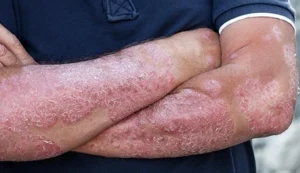Homeopathy for Ankylosing Spondylitis
Ankylosing spondylitis (AS) is a chronic inflammatory condition primarily affecting the spine and sacroiliac joints. It can lead to pain, stiffness, and eventually the fusion of vertebrae, causing reduced mobility and a hunched posture. AS is an autoimmune disorder where the immune system mistakenly attacks healthy tissues, triggering inflammation.
Conventional treatments for AS focus on managing pain and inflammation, but they often come with side effects. Homeopathy offers a gentle and holistic approach, addressing not only the symptoms but also the root cause of the disease. Homeopathic remedies aim to reduce inflammation, improve joint flexibility, and enhance the body’s natural healing capabilities.
Symptoms
Ankylosing spondylitis symptoms can vary but commonly include:
- Persistent pain and stiffness in the lower back and hips, especially in the morning or after inactivity.
- Reduced flexibility of the spine, leading to a hunched posture.
- Pain and swelling in other joints, such as shoulders, knees, or hips.
- Fatigue and general discomfort.
- Difficulty taking deep breaths due to involvement of the ribcage.
- Eye inflammation (uveitis), causing redness, pain, and sensitivity to light.
When to See a Doctor
Consult a doctor if you experience:
- Persistent back pain or stiffness lasting for weeks or months.
- Pain that improves with exercise but not with rest.
- Difficulty performing daily tasks due to reduced mobility.
- Eye symptoms such as pain, redness, or vision changes.
- Sudden onset of severe symptoms, as these may indicate complications.
Early diagnosis and treatment are crucial to managing AS and preventing long-term complications.
Causes
The exact cause of ankylosing spondylitis is unknown, but the following factors are linked to its development:
- Genetics: The HLA-B27 gene is strongly associated with AS, although not everyone with this gene develops the condition.
- Autoimmune Dysfunction: The immune system mistakenly attacks the body’s tissues, leading to inflammation.
- Infections: Certain infections may trigger the immune response that leads to AS.
Risk Factors
Several factors increase the risk of developing ankylosing spondylitis:
- Age: AS typically begins in early adulthood, between ages 17 and 45.
- Gender: Men are more commonly affected than women.
- Family History: A close relative with AS increases the likelihood of developing the condition.
- Genetics: Carrying the HLA-B27 gene significantly raises the risk.
Complications
If left untreated, AS can lead to:
- Spinal Fusion: Inflammation can cause the vertebrae to fuse, resulting in reduced flexibility and mobility.
- Kyphosis: Severe forward curvature of the spine.
- Breathing Problems: Inflammation of the ribcage can restrict lung expansion.
- Cardiovascular Issues: AS may increase the risk of heart disease and aortitis (inflammation of the aorta).
- Eye Inflammation: Uveitis can recur and affect vision if untreated.
Preventions
While there’s no guaranteed way to prevent AS, the following measures may reduce the risk or severity:
- Stay Active: Regular exercise strengthens the back and maintains flexibility.
- Maintain Good Posture: Prevents undue stress on the spine.
- Quit Smoking: Reduces inflammation and improves lung health.
- Healthy Diet: Anti-inflammatory foods can help manage symptoms.
- Regular Monitoring: Early intervention can prevent severe complications.
Diagnosis
Diagnosing ankylosing spondylitis involves:
- Medical History: Detailed discussion of symptoms, family history, and lifestyle.
- Physical Examination: Testing spinal mobility and areas of pain or tenderness.
- Imaging Tests:
- X-rays to identify changes in the sacroiliac joints and spine.
- MRI scans for early signs of inflammation and joint damage.
- Blood Tests:
- HLA-B27 gene testing.
- Markers of inflammation such as C-reactive protein (CRP) or erythrocyte sedimentation rate (ESR).
Treatments
Homeopathy for Ankylosing Spondylitis
Homeopathic remedies are tailored to the individual’s unique symptoms, constitution, and emotional state. They aim to relieve pain, reduce inflammation, and enhance overall well-being.
Lifestyle and Home Remedies
Combining homeopathic remedies with lifestyle changes can help manage symptoms effectively:
- Stretch Regularly: Gentle stretching improves flexibility and reduces stiffness.
- Engage in Low-Impact Exercises: Activities like swimming and yoga promote spinal health.
- Use Heat and Cold Packs: Alleviate pain and inflammation in affected areas.
- Sleep Comfortably: Use a firm mattress and supportive pillows to maintain posture.
- Maintain a Healthy Weight: Reduces stress on the spine and joints.
- Practice Deep Breathing: Enhances lung capacity and alleviates ribcage stiffness.
Preparing for Your Appointment
Before Your Visit
- Track Symptoms: Note their duration, triggers, and intensity.
- Document Medical History: Include family history and previous diagnoses.
- List Medications: Mention any current treatments or supplements.
What to Expect
- Discussion of your symptoms, lifestyle, and emotional well-being.
- Physical examination and assessment of spinal mobility.
- Personalized homeopathic prescriptions based on your unique symptoms and constitution.
Ankylosing spondylitis can be a challenging condition, but with the right approach, its impact can be managed effectively. Homeopathy offers a natural, holistic way to reduce pain, improve flexibility, and enhance overall health without the side effects associated with conventional treatments.
If you’re struggling with AS, consider consulting a qualified homeopathic practitioner to explore personalized remedies tailored to your needs. Combined with lifestyle modifications and regular monitoring, homeopathy can help you regain mobility, reduce discomfort, and live a fulfilling life

